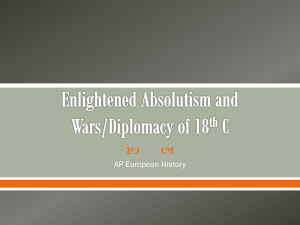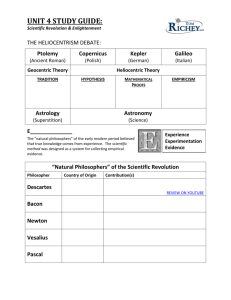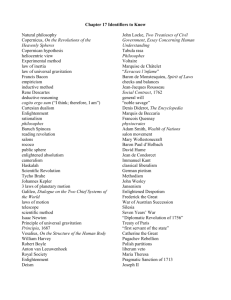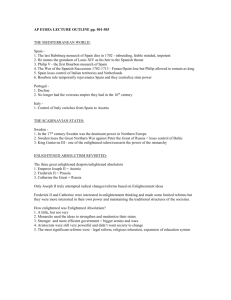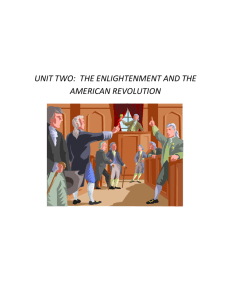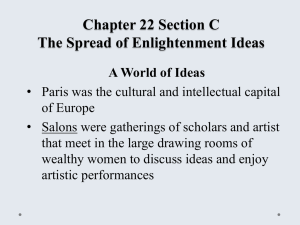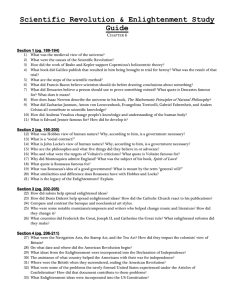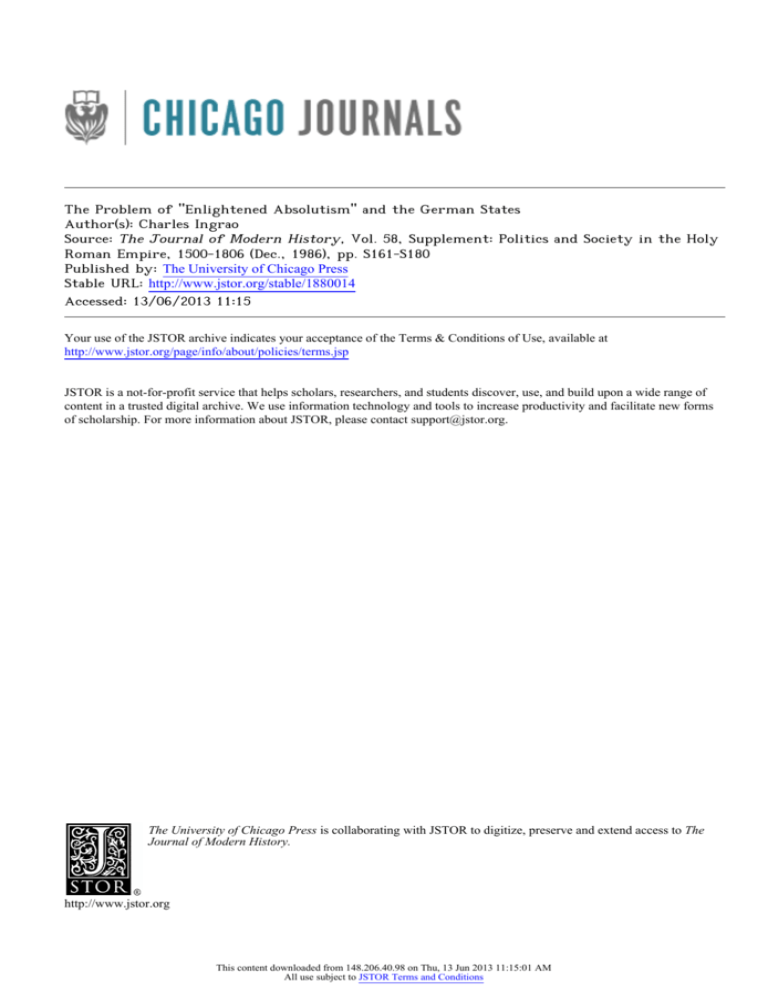
The Problem of "Enlightened Absolutism" and the German States
Author(s): Charles Ingrao
Source: The Journal of Modern History, Vol. 58, Supplement: Politics and Society in the Holy
Roman Empire, 1500-1806 (Dec., 1986), pp. S161-S180
Published by: The University of Chicago Press
Stable URL: http://www.jstor.org/stable/1880014 .
Accessed: 13/06/2013 11:15
Your use of the JSTOR archive indicates your acceptance of the Terms & Conditions of Use, available at .
http://www.jstor.org/page/info/about/policies/terms.jsp
.
JSTOR is a not-for-profit service that helps scholars, researchers, and students discover, use, and build upon a wide range of
content in a trusted digital archive. We use information technology and tools to increase productivity and facilitate new forms
of scholarship. For more information about JSTOR, please contact support@jstor.org.
.
The University of Chicago Press is collaborating with JSTOR to digitize, preserve and extend access to The
Journal of Modern History.
http://www.jstor.org
This content downloaded from 148.206.40.98 on Thu, 13 Jun 2013 11:15:01 AM
All use subject to JSTOR Terms and Conditions
The Problemof "EnlightenedAbsolutism"
and the GermanStates
Charles Ingrao
Purdue University
Among early modernhistoriansfew controversieshave enduredso long
andresolved so little as the ongoingdebateover enlightenedabsolutism.
Overthe past centurytherehas been widespreaddisagreementover both
the motivationand sincerityof those latereighteenth-centuryrulerswho
professed to be converts to Enlightenmentthought. At the same time,
manyscholarshave questionedthe compatibilityof Enlightenmentideals
with any form of authoritariangovernment,especially one that places
limits on the freedomof the individual.For these reasons, there is still
no consensuson whetherenlighteneddespotismcanstandas a conceptually
meaningfulpolitical classificationdistinct from the formsof absolutism
prevalentduringthe age of Louis XIV.
In examiningand analyzingthejudgmentsof those scholarswho have
dealt with this phenomenon,it is difficult to avoid the conclusion that
the task of reachinga consensushas been complicatedby an underlyiIlg
clash of nationalculturalandhistoricalperspectivesSa cleavage thathas
pitted Germanhistoriansagainst the majorityof their colleagues from
France,GreatBritain,andthe UnitedStates.It wouldappearthatprogress
toward defining both the intent and extent of enlightened absolutism
depends on the ability to recognize these cultural biases especially
those that spring from the political mythologies of the Anglo-Saxon
world and divorce them from an impartialevaluationof the recordof
these princes.
.
.
GERMANVIEW
Over the last century the existence of enlightenedmonarchshas been
most widely accepted by Germanhistorians. It was Wilhelm Roscher
who first utilized the term to distinguishthe confessional absolutismof
Philip II and court absolutismof Louis XIV from that form which envisioned the monarchas a state servantdedicatedto the popularwelfare.1
His countrymenFritz Hartungand Leo Just subsequentlyaccepted the
sincerityof the rulers'conversionfromsovereigntybasedon divine right
1 Wilhelm Roscher, Geschichte der National-Oekonomikin Deutschland
(Munich, 1874), pp. 380-81.
[Journal of Modern History 58,SUPP1.
(DeCember
1986)S161-S180]
e 1986bYTheUniVerSitY
OfChiCagO.
0022-2801/86/5804-0013$01.00
A11
rightS
reSerVed.
S161
This content downloaded from 148.206.40.98 on Thu, 13 Jun 2013 11:15:01 AM
All use subject to JSTOR Terms and Conditions
S 162
Ingrao
to public responsibility based on a social contract. By mid-century Ernst
Walder was even suggesting with some justification that the enlightened
monarchs and the French National Assembly strove for many of the same
objectives, with the former achieving their goals without the need for
bloodshed .2
Of course, another major distinction between revolutionary France and
the neighboring princes was that the monarchs allowed little latitude for
popular participation in government. That they chose instead to rule by
Reinhold Koser's famous formula "Everything for the people, nothing
by the people'' did not, however, detract from their accomplishments.3
Indeed, Hartung pointedly rejected the term ''enlightened despotism"
in favor of ''enlightened absolutism" because the rulers themselves voluntarily submitted to immutable natural laws and limits they placed on
the exercise of royal power a choice of words that has gained general
acceptance among contemporary German historians .4 Moreover, in
speaking of aufgeklarter Absolutismus, today's leading German historians
have maintained much the same position that the monarchs represented
a clear-cut evolution from their baroque predecessors and were influenced
and motivated by Enlightenment ideals in the prosecution of reforms that
reflected a genuine sense of social responsibility.5
WESTERN
CRITICISM
Scholars outside Germany have, however, been far less accepting of the
whole notion of enlightened monarchs, whether they ruled by ' 'despotism"
or ''absolutism.'' With some early exceptions such as Geoffrey Bruun,
W. H. Bruford, and Leo Gershoy,6 they have from the beginning disputed
' Fritz Hartung, ''Die Epochen der absoluten Monarchie in der neueren Geschichte,'' Elistorische Zeitschrift 145 (1932): 46-52, and Enlightened Despotism
(London, 1957), pp. 20, 23, 28-29, 140; Leo Just, ''Der Aufgeklarte Absolutismus,'' in Just et al., Elandbuch der deutschen Geschichte 2 (1938): 1-126;
Ernst Walder, ''Zwei Studien uber den aufgeklarten Absolutismus,'' Schweizer
Beitrage zur Allgemeinen Geschichte 15 (1957): 136.
3 Reinhold Koser, ''Die Epochen der absoluten Monarchie in der neueren
Geschichte, ' ' Elistorische Zeitschrift 61 (1889): 285.
4 Hartung, Enlightened Despotism, p. 7.
5 Karl Otmar Fr. von Aretin, ed., Der Aufgeklarte Absolutismus (Cologne,
1974), p. 14; Eberhard Weis, "Absolute Monarchie und Reform in Deutschland
des spaten 18. und des fruhen 19. Jahrhunderts," in Geschichte in der Gesellschaft:
Festschrift fur Karl Bosl (Stuttgart, 1974), pp. 438-43; Rudolf Vierhaus,
"Deutschland im 18. Jahrhundert," in Aufklarung, Absolutismus, und Burgertum
in Deutschland, ed. Franklin Kopitsch (Munich, 1976), pp. 182-83.
6 Geoffrey Bruun, The Enlightened Despots (New York, 1929); W. H. Bruford,
Germ(lnx in the Eighteenth Century (Cambridge, 1965; first published, 1935),
This content downloaded from 148.206.40.98 on Thu, 13 Jun 2013 11:15:01 AM
All use subject to JSTOR Terms and Conditions
TheProblem of "EnlightenedAbsolutism"
S 163
the Germanassumptionthat the monarchswere inspiredby benevolent
motives, arguing instead that their reforms maskedattemptsto achieve
parallelbut less ''enlightened'' goals. Frenchscholarshave presenteda
solid phalanxin chargingthat the monarchs'attemptsto spureconomic
growth and to reduce the privileges of the church and nobility merely
constituteda remedial attemptat state building in the fashion of Louis
XIV. In the wordsof FrangoisBluche, enlighteneddespotismwas merely
''Louis XIV without the wig.''7
MostAnglo-Americanhistorianshave concurredwiththe Frenchthesis,
seeing the monarchsas merelzytrying to compete on the international
stage with France and Great Britain by minimizing internalopposition
andmaximizingtax receipts.8 Even EastGermanMarxisthistorianshave
joined in the attack on their Westerncountrymen albeit on their own
terms and in their own language by asserting that the monarchspurposefully adoptedbourgeois counsellors and policies in a dual attempt
to catch up with the more economically advancedWest and to forestall
the inevitable bourgeois revolution.9 Nor have the Marxists been the
only Germanskeptics. Germanemigre historians such as Hans Kohn,
Hans Rosenberg, and Ernst Wangermannhave joined the scholars of
pp.11-43; Leo Gershoy, FromDespotismto Revolution,1763-1789 (New York,
1944) .
7 FranJcoisBluche, Le despotismee'claire'
(Saint Armand, 1968), pp. 331-33,
353-54; Paul Hazard, EuropeanThoughtin the EighteenthCentury(New York,
1963), pp. 330-34; Georges Lefebvre, ''Enlightened Despotism" in The Developmentof the ModernStates, ed. Heinz Lubasz (New York, 1964), p. 58;
Charles Moraze, ''Finance et despotisme, essai sur les despotes eclaires,'' Annales Economies, Socie'te's,Civilisations 3 (1948): 279-82, 295-96; Michel
L'Heritier, "Le role historique du despotisme eclaire, particulierement au 18e
siecle, " Bulletinof the InternationalCommitteeof HistoricalSciences 1 (1928):
601-12; Roland Mousnier and Fritz Hartung, ''Quelques problemes concernant
la monarchie absolue,'' in Relazionidel X° Congressointernazionaledi scienze
storiche, vol. 4, Storia moderna(Florence, 1955), p. 17.
8 George Matthew Dutcher, ''The Enlightened Despotism," AnnualReport
of the At1Afor the Year1920, pp. 189-98, and ''Further Considerations on the
Origins and Nature of the Enlightened Despotism," in Persecutionand Liberty:
Essays in Elonorof GeorgeLincolnBurr, pp. 275-403; M. S . Anderson, Europe
in the EighteenthCentury(London, 1961), pp. 122-23; Robert Darnton, ''In
Search of the Enlightenment,'' Journal of ModernElistory43 (1971): 122; John
Gagliardo, EnlightenedDespotism (New York, 1967), pp. 66-68.
9 Ingrid Mittenzwei, ''Uber das Problem des aufgeklarten Absolutismus,"
Zeitschriftfur Geschichtswissenschaft18 (1970): 1168-72; Horst Moller, ' ' Die
Interpretation der Aufklarung in der marxistisch-leninistischen Geschichtsschreibung," ZeitschriftfurhistorischeForschung4 (1977): 469-70; G. Schilfert,
Deutschland, 1648-1789 (Berlin, 1963), p. 157.
This content downloaded from 148.206.40.98 on Thu, 13 Jun 2013 11:15:01 AM
All use subject to JSTOR Terms and Conditions
S 164
Ingrao
their adopted countries by asserting that the monarchswere primarily
interestedin building armies in orderto prosecuteforeign policy frequentlyby aggressive means.10To be sure, not all Westernscholarshave
been quite as dramaticand uncompromisingas Roland Mousnier, who
asserts that ''the sovereigns' goal was simply [to increase] state power
in order to dominate, invade and dismember,that all this 'philosophy'
was only a decoy.''ll There is a widespreadsense that the monarchs
werenottotallydevoidof charitablemotivation,thathumanitarian
instincts
and Enlightenmentideas were often present in their reforms. Rather,it
is that ''cold political and economic requirements. . . had the ultimate
voice in determining. . . the reforms,''l2 that ''enlightenmentalways
took second place to power when there was a problemor conflict.''l3
In additionto disputing the monarchs'motives, the critics have also
questionedthe compatibilityof the authoritarianinstitutionsof absolute
monarchywith the basic libertarianprinciples of the Enlightenment.l4
Even scholars such as LeonardKriegerwho basically accept the notion
thatthe monarchswere influencedby Enlightenmentideas have stressed
the basic contradictionbetweenindividualfreedomandthose ''organizing
principles" of absolutismthat placed no limits on the exercise of sovereignty.ls Some Germanhistorianshave dwelled on what Karl Otmar
von Aretin has termed ''the dilemma of enlightened absolutism" that
could reduce the scourge of corporateprivilege only at the cost of simultaneouslyreducingindividualfreedom.16Theredoes appear,however,
to have been a greaterGermanacceptanceof this contradiction,an acquiescencethatWesternscholarshave attributedto whatemigrehistorian
10Hans Kohn, The Idea of Nationalism (Toronto, 1969), pp. 357-61; Hans
Rosenberg, Bureaucracy, Aristocracy, and Autocracy. The Prussian Experience,
1660-1815 (Boston, 1958), p. 156; Ernst Wangermann, From Joseph 11 to the
Jacobin Trials (Oxford, 1969), p . 3.
11Roland Mousnier, Histoire ge'ne'rale des civilisations, vol. 5, Le XVllle
siecle (Paris, 1953), p. 173.
12 Gagliardo, p. 81.
13 Isser Woloch, Eighteenth Century Europe: Tradition and Progress, 17151789 (New York, 1982), p. 250. Indeed, Reinhold Dorwart goes even further in
asserting that the princes placed even more importance on state power and less
on the popular welfare than did their baroque predecessors (The Prussian Welfare
State before 1740 [Cambridge, Mass., 1971], p. 19).
14 Alfred Cobban, In Search of Humanity (New York, 1960), pp. 161-67;
Peter Gay, The Enlightenment: An Interpretation (New York, 1967-69), 2:49496.
15Leonard Krieger, An Essay on the Theory of Enlightened Despotism (Chicago,
1975), The German Idea of Freedom (Chicago, 1972), pp. 20-23, and Kings
and Philosophers, 1689-1789 (New York, 1970), pp. 253-56.
16 Aretin, ed. (n. 5 above), p. 18
This content downloaded from 148.206.40.98 on Thu, 13 Jun 2013 11:15:01 AM
All use subject to JSTOR Terms and Conditions
TheProblemof "EnlightenedAbsolutism" S165
Georg Iggers has characterizedas a separatehistorical traditionthat
placedmorefaithin the "enlightenedauthoritarian
state," in aRechtsstaat
governedby an " aristocraticand bureaucratic
" elite. 17
ANALYSIS
In evaluatingGermanscholarship,it is possible to concludethatGerman
historiansmayhavebeentoo uncriticalin acceptingenlightenedabsolutism
at face value, a tendencythat may have initially stemmedfrom the eagernessof late nineteenth-centuryPrussianliberalsto praisethe achievements of the Hohenzollerndynasty. Certainlyone feature of German
historiographythat is difficult to accept is its seeming unwillingnessto
confrontthe aggressionof Catherinethe Great,JosephII, andespecially
Frederickthe Greatand the incompatibilityof theirmilitarismwith Enlightenmentprinciples. It is, indeed, difficult to overlook the positive,
sometimesfawning, evaluationsof Frederickby FritzHartung,Gerhard
Ritter,orWaltherHubatsch,whenhis best-knownnon-German
biographer,
ThomasCarlyle, confessed to the greatestdifficultyin hidinghis disgust
for the man. Nevertheless, in theirevaluationof enlightenedabsolutism,
Westernhistorianshave also exhibitedtheirown shareof culturalbiases,
even to the point of criticizing institutionsandpatternsof behaviorthat
are readily toleratedin our own society.
Clearlythe Westernrejectionof the authoritarianelementof absolute
monarchyreflects diverging national definitions of the Enlightenment
legacy. To FrenchscholarstheEnlightenment
is theFrenchEnlightenment,
as it is to their manyNorthAmericancolleagues who sharePeterGay's
expansive claim that "there were many philosophes in the eighteenth
century,but therewas only one enlightenment.''l8Yet the Enlightenment
itself was not a monolithic cultural force but was instead sufficiently
diverse to permit divergence from British or radical French views of
politics. Moreover, though it may be true that the Germans'greater
acceptanceof authorityboth then and now may be rooted in their own
distinctive nationalculture, the fact remainsthat the acceptanceof absolutismcorrespondsmoreclosely to the elitist eighteenth-century
values
expressed by most of the philosophes themselves. Only a minorityof
the philosophes consideredpopularsovereignty to be a componentof
individualfreedom, and most actually accepted or even advocatedthe
advantagesof absolutism,visualizing politics as a meansto an end, not
an end itself. This was clearly the case with the Physiocrats,who first
17 Georg Iggers, The GermanConceptionof History (Middletown, Conn.,
1968), pp. 7-10, 15; Gershoy(n. 6 above), p. 70.
Gay, 1:3.
This content downloaded from 148.206.40.98 on Thu, 13 Jun 2013 11:15:01 AM
All use subject to JSTOR Terms and Conditions
S 166
Ingrao
used the terms despotisme legal and despotejuste et eclaire to classify
princes who served the popularwelfare.19
The argumentcould, in fact, be made that the acceptanceof absolute
authoritywas far more representativeof Enlightenmentthoughtoutside
FranceandGreatBritain. In the MediterraneanworldSpanishandItalian
thinkersassumeda utilitarianstancetowardpoliticsthatgenerallyendorsed
absolutism.20As we all well know, the acceptance of absolutism was
commonto virtuallyall Germanpolitical theorists;once a monarchhad
accepted the limits and responsibilities of naturallaw, all of the most
prominentAuflclarer from Pufendorfand Leibniz throughThomasius
and Wolff to the young Kant recognized the primacy of the central
authoritywithout allowing for any significantchecks.2l What we must
not overlook, however, is that it was the Auflclarung,not the French
Enlightenment,thatwas thedominantinfluencethroughouteasternEurope,
that the Polish and Russian intelligentsia were far more likely to read
and be influencedby the political writings of Germanthinkerssuch as
ChristianWolff than by Locke, Montesquieu,or Rousseau.22In short,
what LeonardKrieger has termed the ''modern union of liberal policy
andabsoluteauthority"23
was morewidely acceptedamongthe eighteenth19 Gagliardo (n. 8 above), pp. 17-18; Gershoy, p. 67; Krieger, Theory of
Enlightened Despotism, pp. 42, 69, 80; Hartung, Enlightened Despotism (n. 2
above), p. 6. Most recently German historians have reemphasized that the Physiocrats were essentially unconcerned with government forms but that they regarded
strong monarchs as the ideal agents for carrying out their programs. Folkert
Hensmann, Staat und Absolutismus im Denken der Physiokraten (Frankfurt, 1976),
pp. 292-304; Ulrich Muhlack, ''Physiokratie und Absolutismus in Frankreich
und Deutschland,'' Zeitschriftfur historische Forschung 9 (1982): 20-21, 28,
32.
20 Richard Herr, The Eighteenth Century Revolution in Spain (Princeton, N . J .,
1958), pp. 231, 444; John Lynch, ''The Iberian States and the Italian States,
1763-1793," in The New Cambridge Modern Elistory (Cambridge, 1968), 8:361,
387-88; Walder (n. 2 above), p. 154.
21 T. C. W. Blanning, ''The German Problem in the Eighteenth Century,"
chap. 1 of Reform and Revolution in Mainz, 1743-1803 (Cambridge, 1974), pp.
22-23; Krieger, German Idea of Freedom, pp. 53-68, 71-74, 77-78, 89-90;
Geraint Parry, ''Enlightened Government and Its Critics in the Eighteenth Century, ' ' Elistoric al Journal 6 ( 1963): 180-8 1.
22 Eduard Winter, Fruhaufklarung (Berlin, 1966), pp. 244, 299-308,
31618, 342, 354; Marc Raeff, ' 'The Well-ordered Police State and the Development
of Modernity in Seventeenth- and Eighteenth-Century Europe: An Attempt at a
Comparative Approach, ' ' American Elistorical Review 80 (1975): 1235-37, and
The Well-ordered Police State. Social and Institutional Change through Law in
the Germanies and Russia, 1600-1800 (New Haven, Conn., 1983), pp. 181,
222-23, 252.
23 Krieger, German Idea of Freedom, p. 45.
This content downloaded from 148.206.40.98 on Thu, 13 Jun 2013 11:15:01 AM
All use subject to JSTOR Terms and Conditions
TheProblem of "EnlightenedAbsolutism"
S167
centuryEuropeanintelligentsiathanits Anglo-Frenchalternative.Twentieth-centuryobservers might be tempted to condemn this choice. Yet
to embrace the early modern application of liberty as championedby
Locke or Montesquieu is to endorse the cause of privilege based on
feudal station (Montesquieu)or wealth (Locke), more than on freedom
as we define it today. To justify a political ethic that sought to preserve
oligarchic institutions merely because they eventually assumed more
democraticforms is to commit historical anachronism.
Westernskepticismregardingprincely motivationis also fraughtwith
ahistorical flaws. It is undoubtedlytrue that the monarchsof the great
powers gave the highest priority to questions of state power vis-a-vis
both domestic and internationaladversaries.Giving precedenceto such
concerns is, however, hardly unique either in the past or the present,
where such modern-daygreat powers as the United States, France, and
GreatBritainalso devote a large shareof the nationalwealth to military
spending without incurringthe suspicion that their sovereign authority
is insensitive to the popularwelfare. By the same token, the monarchs'
attemptsto consolidatedomesticpowerparallelthe behaviorof all political
figures, even in democratic societies, who ceaselessly endeavor to
strengthenboth themselves and the offices they hold against potential
adversaries.Meanwhile,to dismissthe monarchs'sincerityon the grounds
thattheirreformssimultaneouslyincreasedstatepoweris hardlytenable,
if only because the scope of their reforms extended beyond issues of
nationalpoweror security.As T. C. W. Blanninghas arguedin defending
the altruism behind Joseph II's welfare policies, ''not even Joseph II
could have hoped to transforma deaf and dumb blind crippled lunatic
illegitimate unmarriedmotherinto an effective fightingunit."24
In short, scholarlyskepticismtowardthe so-calledenlighteneddespots
has hinged on the preconceptionsand prejudicesof national historical
traditions.This is most obviouslytruefor Marxisthistorianswhose claims
of widespread''bourgeois" integrationinto governmentsthatwere fearful
of bourgeois revolutioncorrespondto Marxist-Leninistteleology rather
thanto the facts. It also pertainsto the body of Frenchscholarswho see
the Enlightenmentin terms of French thought and absolutismin terms
of Ludovican and Colbertine models right up to the storming of the
Bastille. Perhapsit is too much to suggest that this skepticism toward
enlightened absolutismhas been influencedby France's wartimeexperiences with Germany'slast two authoritariangovernments.The historiographicalrecordmakes it ratherlikely, however, that Westernskep24 T. C. W. Blanning, Joseph II and EnlightenedDespotism (Harlow, Essex,
1970), p. 72.
This content downloaded from 148.206.40.98 on Thu, 13 Jun 2013 11:15:01 AM
All use subject to JSTOR Terms and Conditions
S168
Ingrao
ticism has been strongly influencedby the political orientationof the
critics.25Thepotentcombinationof WhighistoryandAmericanpolitical
mythology, reinforcedby the twentieth-centuryexperiencewith authoritarianism,has madeit virtuallyimpossiblefor British, NorthAmerican,
and Germanexpatriatescholars to perceive or to attributebenevolent
motivationto any authoritarian
regime.This wouldappearto be especially
true among those historianswriting in the 1960s whose consciousness
was formed duringor soon after WorldWar II, when the aftermathof
the fascist nightmareandthe growthof Communisttotalitarianismmade
it extremelydifficultto findany formof authoritarianism
palatable.Such
an interpretationmightexplainthe acceptanceof enlightenedabsolutism
earlierin the centuryby Bruford,Bruun, and Gershoy, before authoritarianismhad becomewholly discredited,andthe generallyless skeptical
natureof Westerncriticism in the last decade or so, when manyBritish
andAmericanscholarshave tendedto judge enlightenedabsolutismmore
favorablyand, in at least one instance, temperthe skepticismof their
earlierwritings.26
RECENT
SCHOLARSHIP
Historianssuch as Paul Bernardand T. C. W. Blanninghave tendedto
-stressthe influenceof Enlightenmentideas and the benevolentmotives
behindthe monarchs'policies. Today's scholarsarealso morecognizant
of the divergentnationalcurrentsof eighteenth-century
thoughtand generallyrejectthe presumedhomogeneityof a single Enlightenmentclosely
modeledafterthe French.27Finally, the outpouringof new monographs
documentingthe reformprogramsof variousrulershas inclinedhistorians
like HamishScott to concludethat "the remarkableextent and the considerablesuccess of the reformsintroducednow seem establishedbeyond
qUeStiOn.28
Nevertheless, Anglo-Americanacceptanceof enlightenedabsolutism
remainsqualifiedby one criticism first expressed two decades ago but
increasinglyheard today: that, however extensive and successful they
mayhavebeen, the reformsthemselvesrepresentedno morethancosmetic
25 As suggested by Paul Bernard, Jesuits and
Jacobins: Enlightenmentand
EnlightenedDespotismin Austria (Urbana, Ill ., 1971), pp. 170-71.
26 Hamish Scott has discussed this recent trend in
Anglo-American scholarship
and specifically notes the revision in M. S. Anderson's position as
evidenced by
the 1976 edition of his Europein the EighteenthCentury(originally
published
in 1961) . See Hamish Scott, "Whatever Happened to the Enlightened
Despots?"
History 68 (1983): 245-47.
27 Roy Porter and Mikulas Teich, eds ., The
EnlightenmentinNationalContext
(Cambridge, 1981) .
28 Scott, p. 247.
This content downloaded from 148.206.40.98 on Thu, 13 Jun 2013 11:15:01 AM
All use subject to JSTOR Terms and Conditions
TheProblemof "EnlightenedAbsolutism" S 169
adjustments
thatcorrectedspecificabusesbutfailedto removethestructural
hubris of the old regime.29Simply put, there was a considerablegap
between the philosophes' visions and sanguine expectations of their
"philosopherkings" and their actual accomplishments.Helen Liebel
has, indeed, suggestedthatmonarchslike JosephII even usedtheirpower
to preserveexisting structures a chargethatmightbe even moretenable
whenappliedto CatherineII andfellow CanadianhistorianKarlWegert
has chargedthat the monarchscarriedout reformsonly when they felt
menacedby unrestand wished to preemptupheaval.30
EberhardWeis has rebuttedthe chargethatreformwas merelycosmetic
by pointing to the monarchs'contributionin replacing the entrenched
feudalstructurewith modernbureaucratic
systemsandeconomicpolicies,
as well as in the sheervolume of specific achievementsin jurisprudence,
health care, education, religious toleration, public administration,and
agrarianreform.3l Such attemptsto demonstratethe extensivens of
reformmight ultimatelyprove effective in dispelling the skepticismof
those who point to the incompletenatureof governmentinitiatives. Yet
for the proponentsto continue the debate on these terms is to accept
battle underconditions alreadyweighted against impartialanalysis. In
theirdebatewith those who acceptthe notionof enlightenedabsolutism,
skeptics have essentially placed their colleagues in no fewer than three
catch-22 situations. First, they insist that the monarchsprove their motivationby dismantlingthe old orderbutthattheydo so withoutsacrificing
the Enlightenmentprincipleof individualfreedom.Second,theygenerally
attributethe monarchs'attackson corporateprivilege to state building
yet criticize the sincerity of their social consciousnessand chargethem
with defendingthe traditionalorderwheneverthey fail to go far enough.
Finally, in those instanceswhen a monarchlike JosephII did undertake
29 Lefebvre (n. 7 above), pp. 62-63; Klaus
Epstein, The Genesis of German
Conservatism(Princeton,N.J., 1966), p. 176; Gagliardo(n. 8 above), p. 65;
RaymondBirn, Crisis,Absolutism,Revolution:Europe,1648-1789/91(Hinsdale,
Ill., 1977), p. 240. While concedingthatthe monarchswere influenced
by Enlightenmentideas, OlwenHuftonaddsthat"influenceis one thing, turningone's
state into a lab experimentwas somethingelse and no rulerdid that"
Privilege and Protest, 1730-1789 [Ithaca,N.Y., 1980], pp. 85-86). (Europe:
30 HelenLiebel, "Enlightened
DespotismandtheCrisisof Societyin Germany,"
EnlightenmentEssays1 (1970): 168; KarlWegert, "PatrimonialRule, Popular
Self-InterestandJacobinismin Germany,1763-1800,"Journalof Modern
53 (1981): 440-55. Even MarxisthistorianIngridMittenzweiechoes History
in an otherwise milder appraisalof Frederickby classifying him in this view
her
recent book as a man of the nobility who "erected barriersagainstthe most
modern
age" (Friedrich11. von Preussen:Eine Biographie [Cologne, 1980], pp.
2067, 212).
31 Weis (n. 5 above), pp. 454-55.
This content downloaded from 148.206.40.98 on Thu, 13 Jun 2013 11:15:01 AM
All use subject to JSTOR Terms and Conditions
S 170
Ingrao
numerous, drastic attacks on the old order, they never hesitate to repeat
the accepted judgment of all historians that he was a fool to attempt too
much too quickly, a '' 'sorcerer's apprentice' of the French philosophes''32
who should have known where to stop but instead doomed himself to
failure.
The case of Joseph II demonstrates that the monarchs were limited in
their ability to tear down old structures, that there were limits to what
measures they could initiate, regardless of their views. Recent scholarship
has emphasized the presence of considerable opposition to domestic reform
in most of the Old Regime's ''absolute" monarchies, whether that resistance came from the church, the nobility, the government bureaucracy,
or the general population. Indeed, as Marc Raeff has suggested, reforming
monarchs were generally obliged to rely on already-constituted corporate
and administrative bodies in order to carry out their programs.33 Hence,
they were often limited in what they could do by the need to reach a
consensus with existing institutions, especially in the larger European
states. The philosophes' (and especially the Physiocrats') vision of an
all-powerful ruler was thus a utopian one that had, in all probability,
been hewn from the Ludovican paradigm of which all Frenchmen were
aware but which was no longer a reality anywhere in Europe during the
remainder of the prerevolutionary era. Enlightened absolutism as the
philosophes envisioned it could never exist, even if the rulers were enlightened, because they were simply not "absolute."
Moreover, proponents of the concept of enlightened absolutism would
not be unjustified in pointing out that no government, however benevolent
or inspired it might be by new ideas, ever carries out a radical or thorough
change of its social, economic, or political infrastructure, except in times
of violent upheaval. It is, rather, the nature of governments and the
societies they represent to retain cultural and institutional continuity with
their past, even to the point of utilizing new ideas to reinforce the status
quo, and to admit to change only at a gradual pace.34 In fact, as a rule
the philosophes themselves were sufficiently at home with the existing
system to abstain from advocating radical change a point that could be
Bernard(n. 25 above), p. 168.
Raeff, ''Well-orderedPolice State,'' pp. 1233-38, and The Well-ordered
Police State, pp.251-52.
34 A point applied to the eighteenth-centuryworld by Anderson, flistorians
and Eighteenth-Century Europe (New York, 1979), pp. 119-31; CharlesIngrao,
'' 'BarbarousStrangers':Hessian State and Society duringthe AmericanRevolution,'' American flistorical Review 87 (1982): 955-60; Raeff, ''The WellorderedPolice State" (n. 22 above), pp. 1221-29.
32
33
This content downloaded from 148.206.40.98 on Thu, 13 Jun 2013 11:15:01 AM
All use subject to JSTOR Terms and Conditions
The Problem of "EnlightenedAbsolutism" S171
applied not just to Montesquieu and Locke, but also to Voltaire, most
Aupklarer,and even the Physiocrats.3s
If we are to judge enlightened absolutism fairly, it seems essential
that we recognize that, like all progressive historical forces, it interacted
with established values and institutions that limited and shaped its thrust.
Only then can we avert the philosophes' mistake in exaggerating its
potential or that of modern-day skeptics in rejecting its validity. In this
vein it is helpful to recall Leonard Krieger's insight that ''like the state
of nature, the social contract, and the general will" (or, for that matter
free enterprise, democracy, or communism), enlightened despotism existed
as a hypothetical idea that could not necessarily be duplicated in its pure
form. 36
THEGERMANSTATES
The question now arises, If the monarchs never enjoyed the luxury of
being ''absolute" and could not be expected to make sweeping changes,
to what extent were they ''enlightened"? Providing explanations for
limited reform, however valid they may be, does not in itself help gauge
the influence of Enlightenment thought on princely policy. Rather, to
quote Krieger once again, ''the crucial issue of the relations between
profession and deed, between ideology and policy . . . is at the heart of
the dispute over the 'authenticity' of the 'enlightened' in 'enlightened
absolutism.' ''37 The German states provide us with an ideal opportunity
to answer that question. Though they were no more absolute or innovative
than the rulers of the great powers, they still provide a clearer record of
the nature and extent of princely reform, as well as a better impression
of the monarchs' intent.
Until recently one of the regrettable oversights in the debate over
enlightened absolutism has been the almost total neglect of the smaller
European states, and especially the German principalities, in favor of
the ''big three'' of Austria, Prussia, and Russia. French scholars such
as Frangois Bluche have ignored them totally, even while giving due
attention to the Italian principalities, Lorraine, and even Poland. This
is especially unfortunate since both advocates and critics of enlightened
absolutism while often dismissing the principalities either because they
were too small to indicate feasibility or because they never faced the
same problems as larger states have conceded that it was precisely
35 Harvey Chisick, The Limits of Reform in the Enlightenment(Princeton,
N .J., 1981), p. 279; HarryPayne, ThePhilosophesand the People (New Haven,
Conn., 1976), pp. 14-17, 62-63, 190; Hensmann(n. 19 above), pp. 292-99.
36 Krieger, Theoryof EnlightenedDespotism (n. 15 above), p. 89.
37 Krieger, Kings and Philosophers (n. 15 above), p. 253.
This content downloaded from 148.206.40.98 on Thu, 13 Jun 2013 11:15:01 AM
All use subject to JSTOR Terms and Conditions
S172
Ingrao
therethat enlightenedgovernmentfunctionedbest.38This neglect is especially ironic because such philosophesas Montesquieu,Voltaire, and
Rousseauspecifically expressed a preferencefor smallerstates as more
efficient and responsiveto the popularwelfare.39
In several respects the Germanstates offered a more favorableenvironmentfor enlightened absolutismthan the great powers. Above all,
they were rarelydistractedby foreignpolicy considerations.Indeed, the
concept of the "incubator," so profitablyemployedby MackWalkeras
a metaphorfor the insularityof Germancommunitylife within the Empire,40can also help us to comprehendthe insulation of the German
principalitiesfromthe dynamicsof powerpolitics. The Empirenot only
providedmilitary security for the smaller states (therebysolving what
the philosophes foresaw as the primarydisadvantageof small states)41
andpredisposedthemtowarda workinginterstatecommunitythatopposed
aggression; more important,it also permittedthem to concentrateon
domesticpolicy withouteliciting the rejoinderof modern-dayskeptics
thatthese monarchswere also impelledby foreignpolicy considerations.
Theprotectionaffordedby the Empirealso permittedthe princelyregimes
to eschew centralizationto the extent that it was pursuedby the great
powers, thereby sparing them the otherwise inevitable clash with the
estates that generally characterizedcrown-countryrelationselsewhere.
It wasin appreciationof thisfactthatone Germanprincechidedeighteenthcenturyobserversfor being "blindedby the brillianceof the great[states]
and seduced by their ability to rewardtheir panegyrists," maintaining
thatit was the smallerstatesthatwere less pronebothto "war andd'espotism.s 42
38 Betty Behrens, "Enlightened Despotism," Historical Journal 18 (1975):
407; Birn (n. 29 above), p. 249; Blanning, Reformand Revolutionin Mainz(n.
21 above), p. 33; Bruford (n. 6 above), pp. 29-30; William Doyle, The Old
EuropeanOrder,1660-1800 (Oxford, 1978), pp. 296-97; Gagliardo (n. 8 above),
p. 82; Hartung, EnlightenedDespotism(n. 2 above), p. 21, and Deutsche Verfassungsgeschichte vom 15. Jahrhundertbis zur Gegenwart(Stuttgart, 1950),
p. 140; Just, "Aufgeklarte Absolutismus" (n. 2 above), p. 98; Krieger, Kings
and Philosophers, p. 281; Weis (n. S above), p. 440; Woloch (n. 13 above), p.
250.
39 EduardSieber, Die IdeedesKleinstaates
beidenDenkerndes 18. Jahrhunderts
in FrankreichundDeutschland(Freiburg, 1920), pp. 7-10, 15, 25-26. Though
not the Physiocrats, who felt that larger states could promote economic prosperity more effectively (ibid., pp. 39-40).
40 Mack Walker, German
HomeTowns:Community,
State, and GeneralEstate,
1648-1871 (Ithaca, N . Y ., 1971), pp . 11- 13.
41 Sieber, pp. 9, 15-16, 30.
42 Curt Ochwadt, ed., Wilhelm
Grafzu Schaumburg-Lippe:
SchriftenundBriefe
(Frankfurt, 1977), 2:283-85.
This content downloaded from 148.206.40.98 on Thu, 13 Jun 2013 11:15:01 AM
All use subject to JSTOR Terms and Conditions
The Problem of "EnlightenedAbsolutism" S173
If the dynamics of the German ''incubator" are useful to the historian
of enlightened absolutism, so is the smaller size of the principalities.
Whereas the larger states were generally oblivious of conditions in the
smaller European states, the German principalities constantly examined
and readily emulated their neighbors, both large and small. As a result
they served as fertile ground for transplantingthe ideas and reform projects
of other regimes, providing the opportunity for numerous pilot projects,
the results of which could be made known to neighboring states through
the medium of Germany's extensive list of political and public affairs
journals. Because of their smaller size, the principalities were also subject
to fewer intermediary levels of provincial estates or administrative offices
that might defuse, dilute, or divert the primary reform objectives of the
sovereign authority. Similarly, the petty princes could devote greater
attention to the local application of their initiatives without the resulting
loss of overall perspective or effectiveness that actually afflicted their
Prussian and Austrian counterparts. They could afford their subjects
greater sensitivity and closer contact, an ideal envisioned by the philosophes themselves, and one that made for closer, more amicable cooperation with the existing corporate bodies in the execution of government
programs .43
The existence of Germany's Kleinstaaterei was, of course, also responsible for a final, indispensable component of enlightened government
within the Empire, namely, the great proliferation of universities and
their close association with their governments and the reforms they initiated. Few historians of the period would disagree with Notker Hammerstein's assertion that the universities had a greater impact in the Reich
than elsewhere in Europe. In the first English-language study of enlightened
government in the German states, Helen Liebel described the "protoliberalism" of university-educated bureaucrats, a point since reiterated
by many Anglo-American historians, such as Mack Walker, who placed
them among the "movers and doers" who effected progressive change
within German society.44
WAS IST AUFKLARUNG?
The question remains, however, exactly what Aufklarungmeant to the
German intelligentsia and to the princes who both ruled and consulted
them. Clearly it lay within the broad stream of Enlightenment thought.
43 Ingrao (n. 34 above), pp. 960-67; Raeff, The Well-orderedPolice State,
p. 46, and ''Well-ordered Police State'' (both in n. 22 above), pp. 1227-28.
44 Helen Liebel, EnlightenedBureaucracyversus EnlightenedDespotism in
Baden, 1750-1792, Transactions of the American Philosophical Society, 55:5
(Philadelphia, 1965), p. 13; Walker, pp. 119-20, 125-33.
This content downloaded from 148.206.40.98 on Thu, 13 Jun 2013 11:15:01 AM
All use subject to JSTOR Terms and Conditions
S 174
Ingrao
Like its Frenchcousin, the Aufklarung treasuredfreedomof thoughtand
expressedits faith in the perfectibilityof man througheducationjust as
it lamentedhis sufferingthroughignoranceandbigotry. It placed a utilitarian emphasis on securing the popular welfare, closely identifying
humanhappinesswith individualcomfortattainedby greaterhumanproductivity. Andit helpedto effect greatersecularization,bothin the world
of ideas and public affairs, by seeking humanhappinessby the workof
men and their governments,ratherthanby the intercessionof God.4s
Yet despite its authenticityandcompatibilitywith the Enlightenment,
theAufklarungwas also distinctive,especiallyin its searchforcompromise
and accommodationwith the existing institutionsof Germanstate and
society. Above all else, the majorityof Aufklarer embracedChristianity,
especially in the Protestantsocieties, where they did not sharethe philosophes' disillusionmentwith the establishedchurch. In the tradition
of LeibnizandWolff, they mergednaturalandrevealedreligion, Pietism
andrationalism,insisting as did Justithat "Divine Revelationin no way
limits humanreason."46
They accepted monarchywith far fewer reservationsthan British,
American,or radicalFrenchthinkers,and for at least threereasonsthat
distinguishedthem from their Westerncohorts:as a groupthe German
princeshadnot discreditedthemselvesby aggression,oppressivetaxation,
religious persecution, or by attempts to destroy the balance between
crownandcorporatebodies even thoughindividualrulershadcertainly
been guilty of each; they had tied the intelligentsiaclosely to their governmentthroughpatronageandparticipationin the power structure;and
they had reinforcedthis supportwith domesticprogramsthatresponded
to the needs of the public welfare. Hence, outside of isolated instances
such as Wurttemberg,antimonarchismor the desire for tangiblechecks
on the executive authorityhadnevercreptinto the popularconsciousness
or become partof the popularcultureandpolitical mythology, as it had
in the United Kingdomor United States. Yet, while the Aufklarer were
monarchists,theyvisualizeda politythatstill accommodated
somevestiges
of feudal society. Most leadingAufklarer such as Johannesvon Muller,
Justi, Forster, Schlozer, or even the PhysiocratMauvillon valued the
combinationof efficient governmentand individual freedom that they
associatedwith the delicate balancebetweencrown andestates thatstill
45 H. B. Nisbet, "'Was ist Aufklarung?':The Conceptof
Enlightenmentin
Eighteenth-Century
Germany," Journalof EuropeanStudies 12 (1982): 77-95.
46 JohannHeinrichGottlobvon Justi, "Uberdie von den
Deistenvorgegebene
Unnotigkeitder christlichenOffenbarungslehre,"Hessische Beitrage2 (1785):
11; Peter HannsReill, The GermanEnlightenmentand the Rise of Historicism
(Berkeley, 1975), pp. 215-16.
This content downloaded from 148.206.40.98 on Thu, 13 Jun 2013 11:15:01 AM
All use subject to JSTOR Terms and Conditions
The Problem of "EnlightenedAbsolutism" S175
survived in most of the German states. Though they did not share Montesquieu's disillusionment with monarchy as practiced in Bourbon France,
many nonetheless accepted his widely held belief in the need to retain
established institutions that served society's current needs by representing
its past.47 Even such loyal paladins of Frederick the Great as Dohm and
Hertzberg valued the historic function performed by the nobility in providing a Zwischengewaltbetween the crown and its subjects.48 Such a
synthesis would have been impossible in a country bitterly disillusioned
with tyranny, whether real or imagined. The record of crown-country
relations within the greater part of the Reich was, however, one of cooperation and consensus more than confrontation.
Within such a context, it was difficult to justify anything more than
compromise and gradual change that avoided the kind of upheaval later
witnessed in France, or even in Josephine Austria. In its acceptance of
Christianity and entrenched monarchical and corporate institutions, the
Aufklarungmay well have been distinct from the mainstream of French
Enlightenment thought though it doubtless had more in common with
Enlightenment currents elsewhere on the Continent.49
If there was anything truly original about the Aufklarung,it was in its
accommodation with cameralism. It is difficult to ignore Marc Raeff's
reminder that cameralism predated both Ludovican absolutism and the
Enlightenment, coming in response to the seventeenth-century need to
raise more revenue and assume church welfare functions. It represented,
in fact, one more entrenched institution that had to be incorporated within
the framework of the new ideology of the eighteenth century, with the
result that cameralism was probably more successful in molding Enlightenment ideas than the other way around. Of course, in its secular outlook,
its emphasis on rational organization and Leibnizian harmony, its commitment to the public welfare, and its identification of happiness with
material comfort, human wealth, and productivity, cameralism certainly
shared much common ground with Enlightenment thought. Nevertheless,
it was the cameralist equation of state = society, reinforced by the Christian
social activism of German Pietism, that permitted the Auflclarerand their
governments to reject the primacy of individual freedom as expressed in
Anglo-French thought with the justification, in the words of Lessing,
Reill, pp. 215-16.
James Van Horn Melton, ''From Enlightenment to Revolution: Hertzberg,
Schlozer, and the Problem of Despotism in the Late Aufklarung,'' CentralEuropeanflistory 12 (1979): 107-8; Rudolf Vierhaus, ''Montesquieu in Deutschland:
Zur Geschichte seiner Wirkung als politischer Schriftsteller im 18. Jahrhundert,"
in CollegiumPhilosophicum:
StudienJoachimRitterzum60. Geburtstag(Stuttgart,
1965), pp. 425, 429-30, 432.
49 See Porter and Teich, eds. (n. 27 above).
48
This content downloaded from 148.206.40.98 on Thu, 13 Jun 2013 11:15:01 AM
All use subject to JSTOR Terms and Conditions
S 176
lngrao
that "the sum of the individualhappinessof all members[of society] is
the happinessof the state.''S°
CONFLICTS
ANDINCONSISTENCIES
The story of Auflclarung and enlightenedabsolutismwithin the German
Empire is, then, that of the interplay of statist, Enlightenment, and
Christiancurrentswithin a socially andpolitically complacentworldthat
was generally satisfied with the existing environment.Yet, despite the
basic complacency of the Auflclarer and carefully molded compatibility
of these diverse currents,complete harmonywas impossible.
Although cameralismperceived the wealth of the individual and the
state as common goals that together served the popular welfare, the
cameralistbureaucracy'sobsession with administrativeefficiency, balanced budgets, and the preservationof sources of revenuesoon became
an end in itself, occasionally supersedingthe bureaucrats'empathyfor
popularmisery. Undersuch influences, the people's ability to pay taxes
or avert poverty became in time a fiscal as well as a social issue.
Cameralistcurrentsalso led to conflictbetweengovernmentregulation
and personal freedom. By 1770 both the primacyof the agrariansector
andthe drawbacksof governmentmonopolies,urbanguilds, andprotective
tariffs had become obvious enough to cameralisttheorists, the princely
regimes,andeven the local estates, all of whichappreciatedthe advantages
of free tradeon prices, quality,andproductivity.SlTherewas also growing
disenchantmentwith the practiceof subsidizingnew industriesthatwere
not suitable for regional marketconditions. Nevertheless, the German
regimes felt an obligation to supportexisting commercialenterprises,
including guilds and crown-supportedentrepreneurs,rather than deal
with the severe short-termeconomic dislocationthatwould occur if protection were removed.They also recognizedthat, while the tradebarriers
of neighboringstates made free trade beyond their bordersimpossible,
their own native economies and marketswere too immatureto provide
start-upcapital for new venturesor to sustainthem once they had begun
50 Ulrich Engelhardt, ''Zum Begriff der Gluckseligkeit in der kameralistischen Staatslehre des 18. Jahrhunderts," ZeitschriftfurhistorischeForschung
8 (1981): 70.
51 Hermann Schulz, Das Systemunddie Prinzipiender Einkunfte
im werdenden
StaatderNeuzeit(1600-1835) (Berlin, 1982), pp. 316-18; Engelhardt, p. 79.
As early as 1766 the Saxe-Gothan Minister and economist J. R. Wegner was
advising other governments to afford local entrepreneurs a ''free hand'' against
monopolies and guilds (Hessisches Staatsarchiv, Marburg, 5)3192, February
26, 1766 memorial). For the cameralists' endorsement of Physiocratic agrarianism,
see John Gagliardo, FromPariah to Patriot: TheChangingImageof the German
Peasant, 1770-1840 (Lexington, Ky., 1979), pp. 34-38, 40.
This content downloaded from 148.206.40.98 on Thu, 13 Jun 2013 11:15:01 AM
All use subject to JSTOR Terms and Conditions
TheProblemof "EnlightenedAbsolutism" S177
operations.Furthermore,the Germanregimes felt compelledto protect
the commonmanfromthe ravagesof freely floatingprices andtherefore
continued to set minimums for wage labor and grain sales following
bumperharvests, togetherwith ceilings for grainprices following crop
failures. In short, notwithstandingtheir theoreticalendorsementof free
trade, they acceptedthe need for continuedgovernmentinterventionas
a necessary evil that better correspondedto the harsh realities of the
Germaneconomy.S2
Thetendencytowardinterventionwentbeyondthecameralistconfidence
in the efficacy of governmentas an instrumentfor securingthe popular
welfare. It was also tied up in a fundamentallypessimistic view of man.
All currentsof Enlightenmentthoughtprofessedman'sintrinsicgoodness,
as well as his naturalcapacities for reason and the pursuitof pleasure.
Yet the Germanregimes saw things differently. They subscribedto an
elitist view common to the entire Europeanintelligentsiathat held the
commonman to be stupid, lazy, resistantto progress, and excessively
pronetowardthe satisfactionof his basest instincts.S3He was ratherlike
a child who, if left unattendedandunsupervised,wouldinvariablyresort
to self-destructivemischief. This view was reinforcedby Christianpessimism, as well as by the first-handexperiences of exasperatedlocal
officials, andfoundits curein governmentoversightthathadthe blessing
of Pietist and cameralistthought.S4
Nor were the princes themselves sparedthe need to choose between
new ideas and establishedvalues. Thoughthey generallyembracedthe
Aupklarung'sagendafor change and theircentralrole in carryingit out,
that agendahad to compete with existing patternsof princelybehavior.
JamesVann has recently directedour attentionto the rulers' expensive
penchantfor court luxury and patronageof the arts that had become a
sourceof prestigeandprincelycompetitionsince the age of Louis XIV.55
In addition, many of the lay princes exhibitedthat strongattachmentto
the military and warfarethat may well be inherentin all societies but
that had become especially prevalent in Germanyafter its successful
52 Hans-JoachimBraun, "Economic Theory and Policy in Germany, 17501800," Journal of EuropeanEconomicHistory 4 (1975): 313-15; Gagliardo,
Pariah to Patriot, pp. 1-2; Raeff, Well-orderedPolice State (n. 22 above), pp.
95-98.
53 Payne, Philosophes and the People (n. 35 above), pp. 1-41, 123, 135;
Gagliardo,Pariah to Patriot, pp. 28-31, 36.
54 Ulrich Fr. Kopp, "Von den Landraten,"in TeutschesStaatsmagazin,ed.
G. H. von Berg (1796), p. 136; Raeff, Well-orderedPolice State, pp. 78-83,
113; Payne, Philosophes and the People, pp. 121-28.
55James Vann, The Making of a State: Wurttemberg,1593-1793 (Ithaca,
N.Y., 1984), pp. 21, 258-62, 265, 280, 296.
This content downloaded from 148.206.40.98 on Thu, 13 Jun 2013 11:15:01 AM
All use subject to JSTOR Terms and Conditions
S178
Ingrao
defenseagainstthe TurksandFrenchandFrederickthe Great'smiraculous
triumphsin the Silesian Wars. Though the princes' limited resources
affordedthem little opportunityto pursue their passions, their predisposition towardcourtandmilitarylife tendedin some instancesto divert
their attention as well as their financialand economic resources from
pressing social problems.
Moreover, not all princes were equally responsive to Enlightenment
ideals, andsome wereclearlynot benevolentat all. Theruler'scharacter,
including his philosophicalorientation,was the single biggest variable
that made every Germanstate unique, just as the bureaucraciesserved
as the most importantcommondenominatoramongthe regimes.
Where
reform was carried out, economic prosperitywas always its primary
goal, an emphasisthatreflectedthe underlying,if largelyparallelthrust
of cameralistthought. Agriculturaland industrialpolicy embraced
the
standardeighteenth-century
mercantilestrategiesof boostinginvestment,
maximizing the use of available land, labor, and technology, and developing new productsand markets.Economic and fiscal motives also
led several states to reduce the burdensof serfdom, of taxation, and of
governmentitself by codifyingthelaw andstreamlining
judicialprocedure.
At the same time, however, Enlightenmentideas left their mark.
There
was widespreadimplementationof Beccarianjurisprudence,with its emphasis on crime preventionandthe eliminationof corporalpunishment.
Most regimes also emphasizedthe dynamicsocial role of educationby
increasingthe numberof schools andlibraries,by improvingbothteacher
preparationand pay, by reducing clerical control over education and
censorship, and by allowing greaterpress andliteraryfreedom.Indeed,
the church'spositionin society was furtherrestrictedby the secularization
of monasteriesand charitableinstitutions, as well as by the
increased
tolerationof Christianminorities and Jews. Governmentalassumption
of charityworkultimatelyled to a spateof new orphanages,
poorhouses,
asylums,andemergencyfood relief measures,as well as improvedhealth
care throughmore rigoroushealth codes and medical education.
CONCLUSION
Of course,noneof theseprogramsradicallyalteredthe structureof
German
society. The recordof the Germanprinces indicates insteadthat, while
manywere trulymotivatedby Enlightenmentideas, they operatedwithin
limitsimposedby entrenchedinstitutionsandvalues,by existingeconomic
realities, as well as by the personalitiesof individualrulers. Even in the
Kleinstaaterei, where domestic policy was rarelydistractedby foreign
political or territorialconsiderations,it is most prudentto concludeonly
thatEnlightenmentideas reinforcedthose existing institutionsandvalues
that still enjoyed the supportof the governmentand entrenchedelites,
This content downloaded from 148.206.40.98 on Thu, 13 Jun 2013 11:15:01 AM
All use subject to JSTOR Terms and Conditions
TheProblemof "EnlightenedAbsolutism" S 179
that it animatedchanges that were compatiblewith and did not threaten
them, but that it was generally insufficientto overturnthem when their
demise threatenedto destabilize society and the state. Enlightenedabsolutism was, after all, not as "enlightened" as the radicalFrenchEnlightenmentmight have wished, nor as "absolute" as the Physiocrats
thoughtit could be. This is not to say thatthe regimes were insincereor
hypocriticalin their acceptanceof Enlightenmentideas but, rather,that
they were subject to the same inertial forces that limit change in all
societies. They were, however, sufficientlyresponsiveto society's needs
to retainwidespreadacceptance.WhenGermanyenteredthe revolutionary
era, it was easy to findliteraryfigureswho welcomedthe events in Paris
as beneficial and necessary for the French but who felt that their own
country needed no such radical change. Today Western scholars like
T. C. W. BlanningandMarcRaeff still echo thejudgmentfirstexpressed
by ErnstWaldernearlythreedecadesago thatthe success of enlightened
absolutismhelped preemptrevolutionwithin a Germansociety thatwas
persuadedof the efficacy and benevolenceof its own system.S6
If the study of history is, indeed, intendedto teach us about people
and their institutionsfrom the empiricalstudy of the past, then perhaps
there is less to be learned from debating enlightenedabsolutismthan
fromstudyingits parallelswithother,modernsocieties. Whatis significant
aboutthe enlightenedgovernmentsof the late eighteenthcenturyis not
the locationof sovereigntyor the eternaldebatebetweenauthoritarianism
anddemocracybut, rather,the recurringexperienceof progressiveideas
andregimesas theyconfrontestablishedvaluesandinstitutions.Historians
who have heretoforebeen obsessed with the authoritariannatureof the
enlightenedmonarchiesand who have been most concernedwith questioningtheirsincerityandtheircommitmentto public welfarehave spent
so much time trying to distance themselves from the monarchiesby
pointing out their differences that they have overlooked the far more
significantsimilarities.It mightbe moreproductiveto look at enlightened
absolutism not as a distinct, perhaps archaic governmentalform that
makes us feel uncomfortableor self-righteous. Rather,we should draw
comparisonsthat are applicableto our own society as the moderncentralized, bureaucraticwelfare state is obliged to deal with the stress
betweenthe desire for rational,equitablereformandentrenched,vested
interests;between fiscal integrityandpublic welfare needs; betweenthe
needs of nationalsecurityanddomesticwelfare;betweena secular, pro56 Blanning,ReformandRevolutionin Mainz(n. 21 above), pp. 293-94,
30516, and TheFrenchRevolutionin Germany:Occupationand Resistance in the
Rhineland,1792-1802 (Oxford, 1983), pp. 43-47, 53-54; Raeff, Well-ordered
Police State, p. 176.
This content downloaded from 148.206.40.98 on Thu, 13 Jun 2013 11:15:01 AM
All use subject to JSTOR Terms and Conditions
S 180
Ingrao
gressive intelligentsia and more popular,traditionalculturalvalues that
arefrequentlyanchoredin spiritualbeliefs or sacrednationalmythologies;
betweengovernmentalinterventionin the interestsof greatersocialjustice
and the protectionof privilege in the name of individualfreedom. Only
when we see the problemin this light will we have trulyunderstoodand
benefitedfrom the study of enlightenedabsolutism.
This content downloaded from 148.206.40.98 on Thu, 13 Jun 2013 11:15:01 AM
All use subject to JSTOR Terms and Conditions

